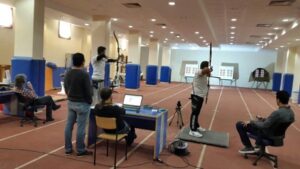Ergen E, Hazir T, Celebi M, et al. Effects of beta-blockers on archery performance, body sway and aiming behaviour. BMJ Open Sport & Exercise Medicine 2021;7:e001071. doi:10.1136/ bmjsem-2021-001071
The full paper can be found here

Tell us more about yourself and the author team
I am a sports and exercise medicine specialist. I also studied sport sciences. Our Team had already worked on a similar study (on the effects of benzodiazepine) on archers more than 10 years ago, therefore, it was relatively easy to continue working together. However, establishing a multidisciplinary group for the first research project was not that easy in the beginning and it took time to get together. Each member of the team has a vast experience in relation to his/her own field of study. One may appreciate that recruiting such experts in a project is difficult as they are already involved in several other studies and have teaching commitments.


What is the story behind your study?
I got involved in archery very long time ago and happened to become the chairperson of World Archery (WA) Federation Medical and Scientific Committee. One of the tasks of this group is to handle Therapeutic Use Exemption submissions. Currently, the use of beta blockers is banned during competitions. However, there were no studies on archers and this ban is based on the results of a study carried out on pistol shooters. In addition, selective beta blockers have not been studied whether they are affecting performance and related parameters on archers or not. So, we asked ourselves if we could run a study and submitted for a support from World Anti-Doping Agency (WADA). We were granted and started the project in 2012 with an Italian research team from Italian National Olympic Committee Sports Science and Medicine Laboratory. Italians were also asking themselves the same question and they were willing to run a similar study. With great regret, just before the study started, the chief of laboratory, Dr. Marcello Faina, passed away and we had to continue the study with our Team.

In your own words, what did you find?
In archery, the aim is to collect as many points as possible by hitting the target. You need a stable body position in order to avoid body sway that may negatively affect shooting performance by changing aiming behavior. Increased heart rate due to anxiety or other factors may increase body (postural) sway thus resulting disturbed aiming behavior. According to the results, neither selective nor non-selective beta blockers do not positively affect the shooting performance in archery during a simulated match situation, despite decreased heart rate.
What was the main challenge you faced in your study?
There were several difficulties that we had to solve:
- This was a study on a banned substance and we had to be very careful not to jeopardize the carrier of an archer (participant). Therefore, we, together with coaches and national federation, carefully planned the study period not to clash with competitions in order to avoid to got caught in a doping test.
- Archers were concerned about the use of a substance in the list and it was difficult to explain them that everything was under control and all permissions were received and information was given to National Anti-Doping Agency.
- Producing a custom-made aiming behavior evaluation device took a long time. There is no such device in the market so we had to develop it in order to collect relevant data. This device should be small (and light) enough not to disturb archer whilst shooting as it is mounted on the bow. Finally, it was decided to produce a laser beamer not to be seen but detected by an infrared camera only.
- Last but not the least, publishing the paper was not easy. 3 journals rejected it simply because (according to their explanatory messages) the study is not within their scope or priority for them and there is a long waiting list. We were very much discouraged after the first submission and rejection by not receiving answers to our questions from the reviewers. We believe that if a reviewer is writing a comment, he/she is also responsible in answering to the questions/comments of the author. Author and reviewer should have a mutual respect to each other. We then realized that the reviewers are not from the field of archery or relevant fields of study rather from one discipline and commented from a single perspective. Therefore, comments were short sided. This study is a multidisciplinary project involving areas like pharmacology, biomechanics, exercise physiology, sport sciences and medicine and a (sports science) journal is supposed to have reviewers from relevant subjects (or editors would find co-opted ones in case there is a multidisciplinary submission).
If there is one take home message from your study, what would that be?
The result of a study (in our case pistol shooting) may not apply to another one (archery). Sport disciplines are unique and need special study designs according to their specific demands/characteristics in order to come to a consensus/decision. WADA and WA now would discuss the results of our study to revise the list of banned substances for the benefit/sake of patients who need to take beta blockers for a fair competition.